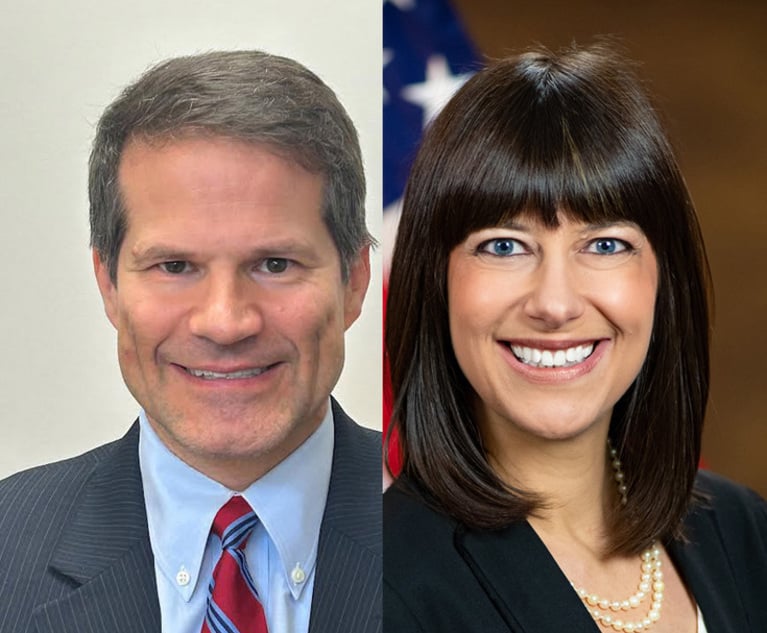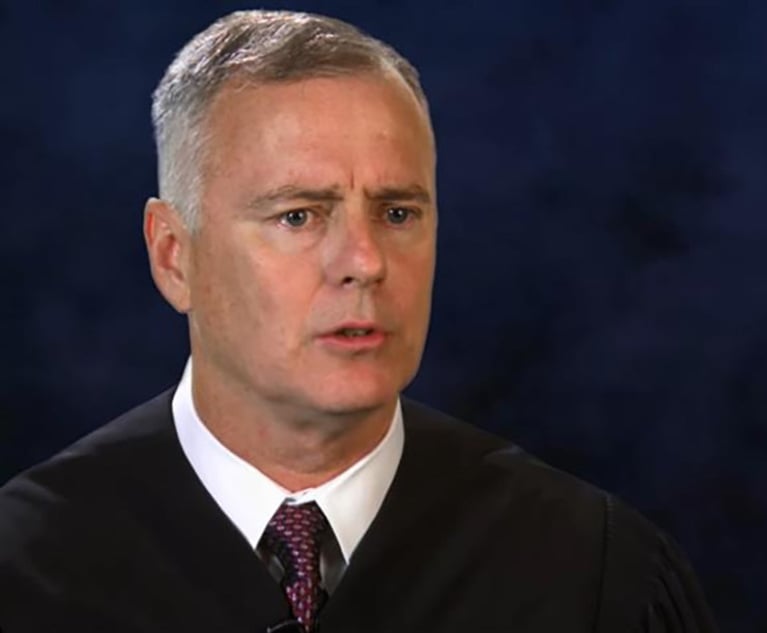 People demonstrate outside the U.S. Supreme Court on the day of arguments in the census case United States Department of Commerce v. New York on April 23, 2019. Credit: Diego M. Radzinschi/ALM
People demonstrate outside the U.S. Supreme Court on the day of arguments in the census case United States Department of Commerce v. New York on April 23, 2019. Credit: Diego M. Radzinschi/ALMUS Appeals Court Says Census Plaintiffs Can Explore New Evidence
The ruling by a divided panel of the U.S. Court of Appeals for the Fourth Circuit allows additional proceedings in the Maryland trial court, where a judge said this week new evidence paints a "disturbing picture" of alleged discriminatory motivations by the Trump administration.
June 25, 2019 at 02:03 PM
6 minute read
The plaintiffs in a Maryland case that challenges the addition of a citizenship question to the 2020 census on Tuesday won the opportunity to present new evidence that purports to show U.S. officials acted with discriminatory motivations in moving to require survey-takers to identify their status in the country.
The ruling by a divided panel of the U.S. Court of Appeals for the Fourth Circuit allows additional proceedings in the trial court, and it comes as the U.S. Supreme Court prepares to announce a decision on a separate but related census case that came to the justices from New York federal district court. The justices could issue a ruling as early as Wednesday on whether the Trump administration acted lawfully in adding the citizenship question.
Late Monday, the plaintiffs in the case pending before the justices—U.S. Department of Commerce v. New York—informed the high court in a letter about the development in the Maryland litigation. They also told the justices that the U.S. Census Bureau released June 21 new research showing how adding a citizenship question would reduce the overall count more greatly than previously stated.
“This new evidence indicates that the addition of a citizenship question will have a substantially greater impact on noncitizen self-response rates than was evident in the record available to the district court at trial,” Dale Ho of the American Civil Liberties Union, counsel to the New York Immigration Coalition, told the justices. On Tuesday, Justice Department lawyers told the Supreme Court in a letter that “the paper is irrelevant to the disposition of this case.”
The appeals court's order Tuesday, sending the Maryland case back to U.S. District Judge George Hazel, was a required step before the plaintiffs could be allowed to present new evidence that surfaced in recent weeks. That new evidence, in the eyes of the challengers, shows a direct connection between Republican redistricting strategist Thomas Hofeller and the U.S. Commerce Department team that was involved in adding the citizenship question.
 Judge James Wynn, during his confirmation hearing in 2009. Photo by Diego M. Radzinschi/ALM
Judge James Wynn, during his confirmation hearing in 2009. Photo by Diego M. Radzinschi/ALM
In a concurring opinion, Fourth Circuit Judge James Wynn Jr. wrote: “It may be prudent upon remand, for the district court to consider whether it is appropriate for the district court to preliminarily enjoin the government from placing the citizenship question on the 2020 census questionnaire pending the district court's and this court's final review of plaintiffs' equal protection and Section 1985 claims.”
Wynn said a preliminary injunction “may be necessary to prevent the printing of the census questionnaire from, at least from the government's perspective, rendering the case moot.”
Trump officials, including Commerce Secretary Wilbur Ross, have denied any discriminatory intent, and they had urged the Fourth Circuit not to allow additional hearings in the Maryland trial court. The administration has argued the addition of the citizenship question would help in the enforcement of the Voting Rights Act. The plaintiffs contend that argument was pretextual, masking actual motivations to benefit Republicans.
Hazel, at an earlier stage in the case, had turned down the plaintiffs' claim that the addition of the citizenship question violated the U.S. Constitution's equal-protection clause. His order Monday was an “indicative” decision that outlined what would happen if the federal appeals court in Richmond, Virginia, returned the census case to him for additional review.
“Plaintiffs' new evidence potentially connects the dots between a discriminatory purpose—diluting Hispanics' political power—and Secretary Ross's decision,” Hazel said in a ruling Monday in the U.S. District Court for the District of Maryland.
The judge said in his order that he would permit the plaintiffs to explore evidence issues for up to 45 days. He also he would order an expedited evidentiary hearing “and provide a speedy ruling.” The new evidence, Hazel said, raised a “substantial issue.”
“The question of whether the secretary's true reasoning was driven by discriminatory animus is similarly weighty,” Hazel said in Monday's ruling. “But, here as well, it is becoming difficult to avoid seeing that which is increasingly clear. As more puzzle pieces are placed on the mat, a disturbing picture of the decisionmakers' motives takes shape.”
The Justice Department has urged both the U.S. Supreme Court and the Fourth Circuit to ignore the new evidence and not to let it interfere with the issuance of a ruling. The Fourth Circuit case is on hold pending the outcome of the Supreme Court litigation.
“Trial is long since over; briefing in this court has concluded; oral argument has been heard; and the court is poised to issue its decision soon,” Noel Francisco, the U.S. solicitor general, said in a filing at the Supreme Court. “Yet now at the eleventh hour, private respondents—but not New York or the other governmental respondents—seek to reopen discovery on the basis of '[n]ew evidence, discovered after oral argument.'” The court should deny that request.”
The Justice Department on Tuesday informed the Supreme Court of the Fourth Circuit's order remanding the Maryland case to the trial court. The government asked the justices to address the equal-protection claims in the forthcoming ruling in the high court.
“The Fourth Circuit's order underscores the need for this court to address the equal protection claim and the immateriality of the Hofeller files in its disposition of the above-captioned case so that the lawfulness of the secretary's decision can be fully and finally resolved,” Noel Francisco, the U.S. solicitor general, said in Tuesday's filing.
The government contends the census paper questionnaire must be finalized by the end of June, and that the Fourth Circuit's order Tuesday “jeopardizes that schedule.”
The Fourth Circuit's order is posted below:
||
Read more:
Census Plaintiffs Alert Supreme Court to 11th Hour New Evidence
This content has been archived. It is available through our partners, LexisNexis® and Bloomberg Law.
To view this content, please continue to their sites.
Not a Lexis Subscriber?
Subscribe Now
Not a Bloomberg Law Subscriber?
Subscribe Now
NOT FOR REPRINT
© 2024 ALM Global, LLC, All Rights Reserved. Request academic re-use from www.copyright.com. All other uses, submit a request to [email protected]. For more information visit Asset & Logo Licensing.
You Might Like
View All

Trump's Solicitor General Expected to 'Flip' Prelogar's Positions at Supreme Court

Auditor Finds 'Significant Deficiency' in FTC Accounting to Tune of $7M
4 minute read
Texas Court Invalidates SEC’s Dealer Rule, Siding with Crypto Advocates
3 minute readTrending Stories
- 1Gibson Dunn Sued By Crypto Client After Lateral Hire Causes Conflict of Interest
- 2Trump's Solicitor General Expected to 'Flip' Prelogar's Positions at Supreme Court
- 3Pharmacy Lawyers See Promise in NY Regulator's Curbs on PBM Industry
- 4Outgoing USPTO Director Kathi Vidal: ‘We All Want the Country to Be in a Better Place’
- 5Supreme Court Will Review Constitutionality Of FCC's Universal Service Fund
Who Got The Work
Michael G. Bongiorno, Andrew Scott Dulberg and Elizabeth E. Driscoll from Wilmer Cutler Pickering Hale and Dorr have stepped in to represent Symbotic Inc., an A.I.-enabled technology platform that focuses on increasing supply chain efficiency, and other defendants in a pending shareholder derivative lawsuit. The case, filed Oct. 2 in Massachusetts District Court by the Brown Law Firm on behalf of Stephen Austen, accuses certain officers and directors of misleading investors in regard to Symbotic's potential for margin growth by failing to disclose that the company was not equipped to timely deploy its systems or manage expenses through project delays. The case, assigned to U.S. District Judge Nathaniel M. Gorton, is 1:24-cv-12522, Austen v. Cohen et al.
Who Got The Work
Edmund Polubinski and Marie Killmond of Davis Polk & Wardwell have entered appearances for data platform software development company MongoDB and other defendants in a pending shareholder derivative lawsuit. The action, filed Oct. 7 in New York Southern District Court by the Brown Law Firm, accuses the company's directors and/or officers of falsely expressing confidence in the company’s restructuring of its sales incentive plan and downplaying the severity of decreases in its upfront commitments. The case is 1:24-cv-07594, Roy v. Ittycheria et al.
Who Got The Work
Amy O. Bruchs and Kurt F. Ellison of Michael Best & Friedrich have entered appearances for Epic Systems Corp. in a pending employment discrimination lawsuit. The suit was filed Sept. 7 in Wisconsin Western District Court by Levine Eisberner LLC and Siri & Glimstad on behalf of a project manager who claims that he was wrongfully terminated after applying for a religious exemption to the defendant's COVID-19 vaccine mandate. The case, assigned to U.S. Magistrate Judge Anita Marie Boor, is 3:24-cv-00630, Secker, Nathan v. Epic Systems Corporation.
Who Got The Work
David X. Sullivan, Thomas J. Finn and Gregory A. Hall from McCarter & English have entered appearances for Sunrun Installation Services in a pending civil rights lawsuit. The complaint was filed Sept. 4 in Connecticut District Court by attorney Robert M. Berke on behalf of former employee George Edward Steins, who was arrested and charged with employing an unregistered home improvement salesperson. The complaint alleges that had Sunrun informed the Connecticut Department of Consumer Protection that the plaintiff's employment had ended in 2017 and that he no longer held Sunrun's home improvement contractor license, he would not have been hit with charges, which were dismissed in May 2024. The case, assigned to U.S. District Judge Jeffrey A. Meyer, is 3:24-cv-01423, Steins v. Sunrun, Inc. et al.
Who Got The Work
Greenberg Traurig shareholder Joshua L. Raskin has entered an appearance for boohoo.com UK Ltd. in a pending patent infringement lawsuit. The suit, filed Sept. 3 in Texas Eastern District Court by Rozier Hardt McDonough on behalf of Alto Dynamics, asserts five patents related to an online shopping platform. The case, assigned to U.S. District Judge Rodney Gilstrap, is 2:24-cv-00719, Alto Dynamics, LLC v. boohoo.com UK Limited.
Featured Firms
Law Offices of Gary Martin Hays & Associates, P.C.
(470) 294-1674
Law Offices of Mark E. Salomone
(857) 444-6468
Smith & Hassler
(713) 739-1250








